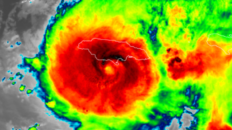
How can we make our resources more accessible to the deaf community? That is the question Met Office staff have been discussing with members of the Deaf Academy.
Through online and in-person workshops, we have been working with students to develop a greater understanding of their needs and preferences when it comes to information about weather and climate.
Mark Stocks, the Academy’s partnership and community manager said: “Sometimes people don’t communicate with a deaf person, as they are afraid of getting that communication wrong. So through these sessions, we aim to reassure people and give them the tools they need to take away that fear.”
The workshop included the students delivering a British Sign Language (BSL) workshop to participants, which included a section on popular meteorological terms.
Deaf Academy student Hugh, 24, said it was “important to teach deaf awareness to hearing people in order to help them understand deaf culture”, and Timothy, 19, said the community needed to “feel included in a hearing world” because “it helps ensure the two communities are more integrated.”
The students also talked about how they receive their news and weather, as well as looking at various Met Office content and discussing how they could be improved to make them even more accessible.
Susan Ward-Rice, Equality, Diversity and Inclusion Specialist Partner at the Met Office said: “We are continuously striving to be as inclusive as possible with everyone we engage with, whether that be through our recruitment or the content we produce.
“I found the awareness sessions engaging, educational and informative. It’s been really useful to show some of our communications content to the students and find out how we can make our resources even more accessible and inclusive to members of the D/deaf community.”
Engaging with and understanding the diversity of our people and those we serve is a key priority of the Met Office, and we look forward to working with the Deaf Academy more in the future.
Deaf Awareness Facts
There are 12 million adults in the UK who are deaf, have hearing loss or tinnitus.
There is no consensus on the total number of BSL users or deaf BSL users in the UK. The 2021 Census reports 22,000 people use BSL as their main language in England and Wales.
The British Deaf Association estimate that the total number of people in the UK who use BSL (not necessarily as their main language) is estimated to be 151,000.
Sometimes, you might see the word deaf as Deaf or D/deaf. The capitalisation of Deaf is often used by people who see their deafness as more than just a disability, but also their cultural identity. Generally, sign language will be their first language.
People who have experienced hearing loss throughout life are less likely to share this sense of cultural identity and may describe themselves as ‘deafened’ or ‘hard of hearing’, with the latter term being more common among older people.
People who have retained a considerable degree of hearing might refer to themselves as ‘partially deaf’ or may refer to their level of hearing as mild to moderate.
9/10 of respondents to the RNID Subtitle It Report (2023) with hearing loss and who were deaf, usually or always use subtitles when watching TV.
People who are deaf or have hearing loss have individual communications, and you should ask someone how best you can communicate with them. RNID have produced some communication tips.
If you are organising events, make your event deaf aware. There are several different ways to make events more inclusive.
Source: metoffice.gov.uk







 Please wait...
Please wait...
Add comment